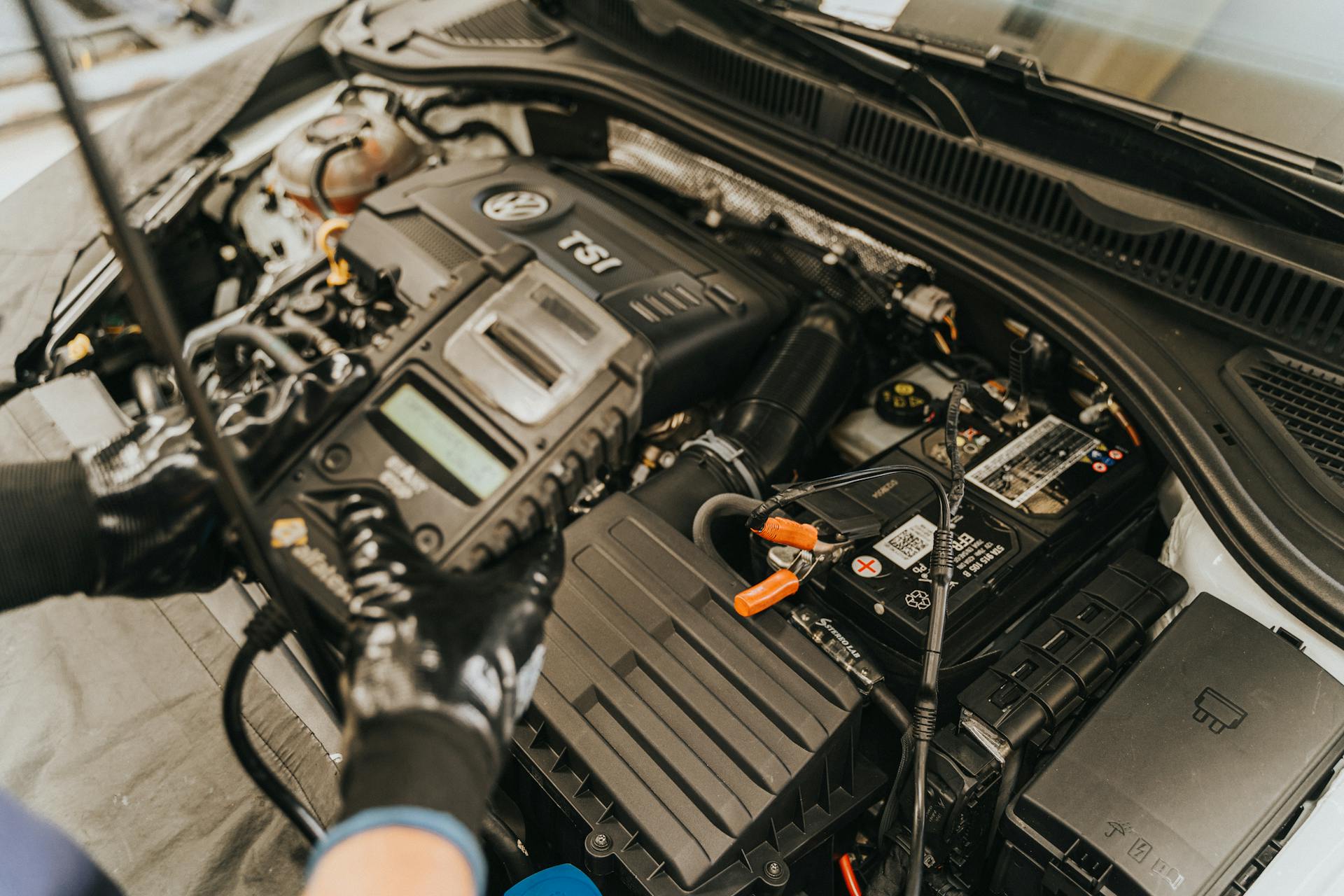
An auto equity loan is a type of loan that allows you to borrow money using the value of your car as collateral. You can use the loan to pay for expenses, consolidate debt, or even cover a down payment on a new vehicle.
The amount you can borrow is based on the current market value of your car, which is typically determined by a lender or a third-party service. This means that if your car is worth $10,000, you may be able to borrow up to that amount.
To qualify for an auto equity loan, you'll typically need to have a steady income, a good credit score, and a car that's paid off or nearly paid off. You'll also need to provide proof of ownership and the car's current value.
The loan term for an auto equity loan can vary, but it's often shorter than a traditional loan, typically ranging from a few months to a few years.
What is an Auto Equity Loan
To get an auto equity loan, you must be the owner of the car used to secure the loan.
You'll need to show other documents, such as your driver's license and proof of income, to the lender.
Your credit score will be important in determining the interest rate and amount you're eligible to borrow.
On average, auto equity loan interest rates range from 6% to 36%.
It's essential to compare different lenders to get the best rate.
You'll need to sign a loan agreement and agree to the repayment terms once you decide to accept an offer.
What Are the Benefits of
Auto equity loans can be a viable option for those in need of emergency funds. They generally have lower interest rates than other secured loan options, making it easier to pay back the loan in a reasonable time frame.
One of the main advantages of auto equity loans is that they're often easier to qualify for compared with traditional loans. This is because your car acts as collateral, reducing the risk for lenders.
Good interest rates can be found with auto equity loans, allowing you to borrow money at a lower cost. Research online lenders to find the best rates and terms for your situation.
Despite the risks, auto equity loans can provide a much-needed source of funds in emergency situations.
Disadvantages and Risks
Auto equity loans can be a costly option. This is due to interest costs, which can add up quickly.
Some auto equity loans come with additional fees, such as DMV lien fees and documentary stamp tax fees, that can be included in the loan. These fees will also incur interest over time.
Your annual percentage rate (APR) should reflect any fees associated with your loan. This means you'll pay interest on the fees as well as the loan itself.
Are Secured?
Auto equity loans can be a risky financial decision. Auto equity loans are secured loans, meaning your vehicle serves as collateral, which can be repossessed if you default on payments.
Secured loans can be a double-edged sword. The collateral backing the loan can also limit your freedom to sell or trade in your vehicle while you're still paying off the loan.
Auto equity loans are secured loans because they're backed by your vehicle. This means lenders have a tangible asset to seize if you fail to make payments.
Some Disadvantages
Auto equity loans can be quite pricey, considering the interest costs, DMV lien fees, and documentary stamp tax fees that may be tacked on. These fees can add up and increase your annual percentage rate (APR) over time.
You may find yourself owing more on your car than it's worth, a situation known as being upside down on your car loan. This can be a problem if you try to sell or trade in your vehicle.
Auto equity loans are secured loans, which means your vehicle serves as collateral. This can be a risk, as you could lose your car if you're unable to repay the loan.
Affect Credit Score
Applying for an auto equity loan can have a slight negative impact on your credit score due to the credit check, also known as a hard credit inquiry.
This is because most lenders will check your credit report from at least one of the three major credit bureaus.
A well-managed auto equity loan can help you build positive credit if you always pay on time.
However, if you make late payments or default on your debt, an auto equity loan can damage your credit score instead.
Here are some potential credit score impacts of an auto equity loan:
- A credit check can have a slight negative impact on your credit score.
- A well-managed auto equity loan can help build positive credit.
- Missed or late payments can damage your credit score.
It's essential to carefully consider your financial situation and make timely payments to minimize the potential negative impact on your credit score.
Alternatives and Options
If you're considering an auto equity loan, it's worth exploring alternative options. You may be able to refinance your car loan to get a lower interest rate.
Auto loan refinance can be a good option if you're struggling to make monthly payments. You can also trade in your car for something cheaper that still fits your needs.
Some people have found that unsecured personal loans can be a viable alternative to auto equity loans. These loans aren't secured by collateral, so you may pay higher interest, but you won't risk losing your property if you can't make payments.
If you're in a financial emergency, you might want to consider payday alternative loans offered through federal credit unions. These loans come with consumer protections like a cap on fees and a ceiling on interest rates.
Borrowing from family can also be an option, but it's essential to discuss expectations and create a monthly payment plan before borrowing money. Bill extensions can also be a temporary solution if you're behind on your bills and contact the company to explain your situation.
Here are some lenders that offer alternative loan options:
Financial Assistance
Auto equity loans can be a viable option for those in need of financial assistance. They allow you to borrow up to 100% to 125% of the equity you have in your vehicle.
To qualify for an auto equity loan, you'll need to assess the value of your car. This involves looking up the current market value of your vehicle using an industry guide like Edmunds or Kelley Blue Book.
The amount of equity you can borrow is calculated by subtracting any remaining loan balance from your vehicle's value. This means if you still have an auto loan attached to your vehicle, you'll need to subtract that balance from your vehicle's value to determine your available equity.
Auto equity loans use your vehicle as collateral, which means the lender can repossess it if you default on the loan. This can be a risk, but it's also a way to access cash you may not have otherwise.
Alternatives and Options
If you're considering alternatives to auto equity loans, you might want to explore refinancing your car loan to get a lower interest rate.
You can also try trading in your car for something cheaper that still fits your needs. This can be a good option if you're struggling to make monthly payments.
Another option is to take out an unsecured personal loan, which isn't secured by collateral, but may come with higher interest rates.
If you're struggling to make payments, you might be able to get a bill extension from the company you're paying. This can give you some extra time to get back on track.
Alternatively, you could borrow money from family, but make sure to discuss expectations and a payment plan before doing so.
Home equity loans can be a good option if you have built up equity in your home, but be aware that you risk losing your home to foreclosure if you can't repay the loan.
A cash-out auto loan refinance can also be an option, but be aware that you'll need to qualify for a new loan to pay off your original car loan.
Personal loans can be another versatile borrowing option, but be aware that bad credit personal loans may come with higher interest rates and less attractive borrowing terms.
Here are some lenders that offer alternative loan options:
Where to Get?
If you're looking for options to get an auto equity loan, you're in luck. Some community banks and credit unions offer auto equity loans, but the four largest banks in the country by deposits - Bank of America, Chase, Citibank, and Wells Fargo - do not.

You can find auto equity loans at smaller banks, and federal credit unions have a maximum annual percentage rate of 18%. This can be a more advantageous option, especially if you have a good credit score.
Some online lenders offer secured loans with a maximum APR of 36% and two- to five-year repayment terms. Regulators and consumer advocates say 36% is the upper limit of an affordable loan.
Here are some specific lenders to consider:
- OneMain Financial may have your loan funded as soon as one hour after your loan closes.
- Best Egg offers two to seven year loan terms and no prepayment penalties.
- Upgrade does charge an origination fee but you won’t be charged for paying your loan off early.
Keep in mind that the terms of your auto equity loan will depend on your credit history, income, and the value of your car.
Frequently Asked Questions
Are vehicle equity loans a good idea?
Vehicle equity loans can be a viable option for those with significant vehicle equity, but they come with risks like repossession and negative equity. Consider the pros and cons before making a decision.
Is an auto equity loan the same as a title loan?
No, auto equity loans and auto title loans are not the same, although they both use car equity. Auto equity loans have more favorable terms, but auto title loans have harsher conditions and higher interest rates.
Is it hard to get an auto equity loan?
Auto equity loans are relatively easy to qualify for, as your car serves as collateral. This makes them a more accessible option in times of financial need.
Sources
Featured Images: pexels.com


